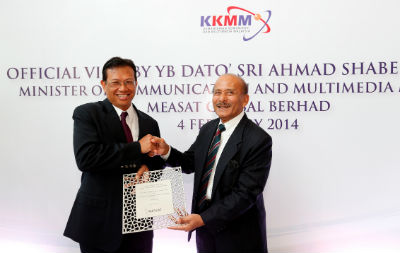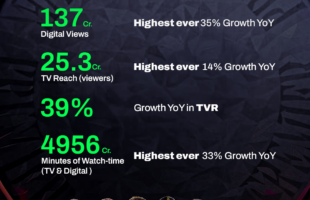
Kuala Lumpur – Asian satellite operator, MEASAT Global Berhad (“MEASAT”), showcased its state-of-the-art satellite system and its plans to further support the growth of Malaysia’s ICT industry during an official visit by YB Dato’ Sri Ahmad Shabery Cheek, Minister of Communication and Multimedia Malaysia, to the MEASAT Teleport and Broadcast Centre (“MTBC”) in Cyberjaya.
The Minister’s visit was organised to understand the capabilities of MEASAT and how MEASAT can support the Malaysian Government in its objectives to efficiently improve the ICT infrastructure across Malaysia for the benefit of the rakyat (people).
YABhg. Tun Dr. Hj. Mohammed Hanif, Director of MEASAT Satellite Systems presenting a memento to YB Dato’ Sri Ahmad Shabery Cheek, Minister of Communication and Multimedia.
“In today’s globalised economy, connectivity and communication infrastructures are key enablers of economic and social growth,” said YB Dato’ Sri Ahmad Shabery Cheek. “In order for Malaysia to achieve developed nation status, the Government has invested strategically in nation-wide ICT infrastructure to support the growth of our industries, services and rakyat (people). As an aspiring high income nation, broadband penetration in itself is not adequate. We need to facilitate high speed and stable connectivity,” he continued.
During the visit, MEASAT announced the upcoming launch of the company’s next satellite, MEASAT-3b. The satellite, with a total project cost of US$370 million (approximately RM1.25 billion), is planned to be launched from the European Spaceport in French Guinea in May 2014. When operational, the satellite will be used to expand video and data services across Malaysia, India, Indonesia and Australia.
“MEASAT is committed to being the satellite operator of choice for the Malaysian Information and Communication Technology Industries, while developing a Malaysian champion with a strong customer base across Asia, Australia and Africa,” said YABhg. Tun Dr. Hj. Mohammed Hanif bin Omar, Director, MEASAT Satellite Systems.
“Today we support a number of the Government’s broadband programmes through the MEASAT-5 satellite. This state-of-the-art satellite provides 3 Gbytes of satellite broadband capacity to Malaysia,” YABhg. Tun Dr. Hj. Mohammed Hanif added.
MEASAT-5 is used by telecommunications operators to support the Malaysian Government’s Universal Service Provision (USP) and National Broadband Initiatives (NBI) to increase broadband coverage across the nation.
“I am impressed with MEASAT’s ongoing investment programme to advance Malaysia’s capabilities in the high-technology satellite sector,” said YB Dato’ Sri Ahmad Shabery Cheek. “As Malaysia’s only licensed commercial satellite operator, MEASAT has and will continue to play a vital role in supporting Malaysia’s ICT infrastructure for both commercial customers and government projects, such as expanding ICT network reach to remote communities.”
“To continue to support the Malaysian Government’s targets to expand the reach and performance of the satellite broadband system, MEASAT is currently finalising plans for its next generation broadband satellite system. This system would be able to increase satellite broadband capacity by between 20 to 30 times,” concluded YABhg. Tun Dr. Hj. Mohammed Hanif.
During the visit, the Minister also launched a book authored by Dr Ali R. Ebadi, MEASAT’s Senior Vice President, Space Systems Development. The book, titled Communications Satellite Fundamentals – From Design to Launch and Operation, was developed as part of MEASAT’s CSR program aimed at supporting the development of future technology leaders for the Malaysian and Global satellite industry. The book will be distributed to Malaysian universities.
Since the launch of MEASAT’s first satellite in 1996, the company has played an instrumental role in furthering satellite communications not just to Malaysia, but across 150 countries comprising of more than 80% of the world’s population. MEASAT has built a leading position in the Asian Direct-to-Home and HD Video Distribution segments through its key orbital slot of 91.5 degrees East.









